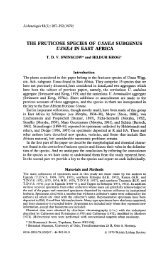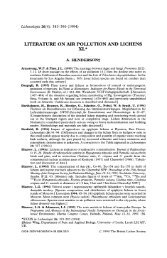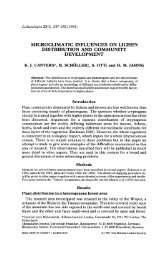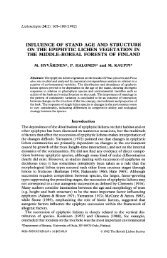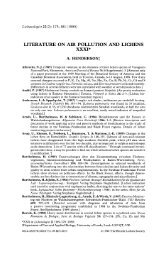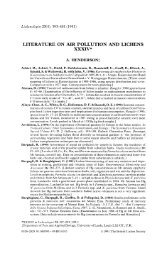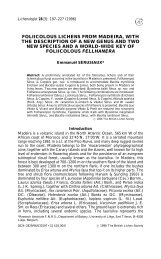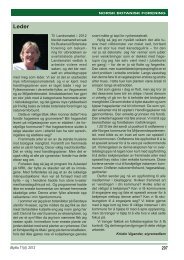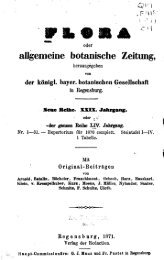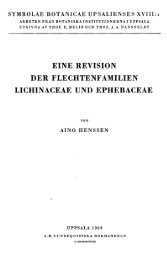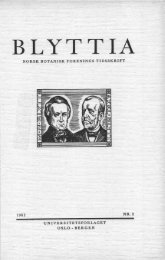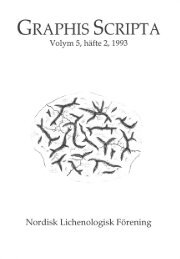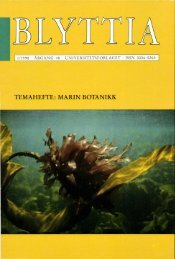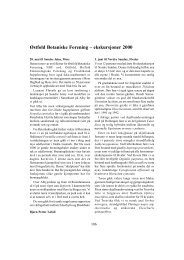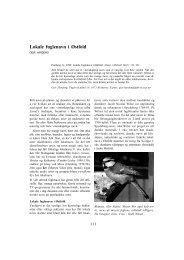British Museum (Natural History)
British Museum (Natural History)
British Museum (Natural History)
You also want an ePaper? Increase the reach of your titles
YUMPU automatically turns print PDFs into web optimized ePapers that Google loves.
ERIK ACHARIUS AND HIS INFLUENCE ON ENGLISH LICHENOLOGY 169<br />
'I avail myself most readily of your obliging permission to write to you in my native tongue, for I<br />
really have so much forgotten Latin from disuse, and compose in it with so greatly difficulty that I<br />
never have recourse to it without reluctance, and without some apprehension lest I should not<br />
kind and instructive<br />
express my thoughts in the manner I intend. I received a few days ago the very<br />
letter, which you had the goodness to write to me on the 31st August, and I beg you to accept my<br />
thanks for the variety of information you have afforded me, and to be assured of the high sense I<br />
entertain of the friendly sentiments you express towards me. Pray believe that I shall always be most<br />
anxious to cultivate intercourse between us, and to shew myself deserving of the opinion you<br />
entertain of me; and pray favour me with your letters as frequently as possible. It gives me exceeding<br />
pleasure to hear that the Manuscript of your Lichenographia Universalis is in such a state of<br />
forwardness. All the botanical world will expect it anxiously, and be ready to receive from you, their<br />
"magnus Lichenum Apollo", the laws which you may be ready to lay down. For my own part I am so<br />
well satisfied with the Genera of your Methodus, and find them so useful that I am half sorry to hear<br />
of the changes you meditate. I hope you will not be offended at my presuming to beg of you not to<br />
establish Genera upon minute differences, unfit for common use; and at my begging still more<br />
strenuously that you would not alter specific names where it can possibly be avoided; even though<br />
you could substitute others more appropriate than those now in use. The confusion of Synonymy is<br />
the great hindrance to the present progress of botanical knowledge and it is particularly injurious in<br />
a tribe so difficult of themselves as the Lichens.<br />
Some of your new Genera I should wish to see inscribed with the names of those Botanists who<br />
have made themselves distinguished among these plants: I wish that no tribe has previously been<br />
dedicated to you, and that what you have called Parmelia might have been called Acharia: for myself<br />
I hope to have a genus when the Fuci are subdivided as they must be; but I should consider it a<br />
favour if you would call one of your Genera of Lichens Borrera, in honour of my friend Mr Borrer,<br />
whom I consider the most able Lichenologist in this Kingdom, and who is now working with me<br />
upon a Lichenographia Britannica. In this task we proceed very slowly on account of the many<br />
doubts and perplexities that we find at every step, nor shall we think of publishing anything till your<br />
Lichenographia Universalis had made its appearance that we may correct our errors by your<br />
knowledge, and follow your nomenclature. I will now take the liberty of offering a few remarks upon<br />
the observations you made on the Lichens I sent you, and if I am in error I trust you will correct me<br />
. . . [then follows a page of comments].<br />
'I have found many new things among the Lichens this summer, but have so nearly filled my paper<br />
that I must reserve all mention of them to my next letter when I will also communicate the characters<br />
of the new species lately figured in English Botany.' (Turner, 18066).<br />
In December Turner wrote to Swartz:<br />
'I have been amusing myself lately with writing a monograph of the genus Opegrapha, and you<br />
would much oblige me by sending in your next letter morsels, however small, of Persoonii, nimbosa,<br />
vulvella, betuligna, rubella, prosodea, obscura, conglomerata, siderella, cerasi, scripta and<br />
dendritica; it appears to me that Dr Acharius has made too many species.' (Turner, 1806c).<br />
The emendations to the Methodus mentioned by Swartz and which had occupied Acharius for<br />
three years since the publication of that work were to be the basis of his next, and largest, work,<br />
the Lichenographia Universalis. In a letter to Smith dated 8 December 1807 (Fig. 10), Acharius<br />
gave details of its publication in Gottingen (to be supervised by Schrader), as well, as an<br />
intimation of the despatch of the lichens for the Linnean Society. Further details of the<br />
Lichenographia universalis are found in letters written in 1808 by Swartz to Smith and to Turner.<br />
Writing to Smith, Swartz observed:<br />
'Even Acharius has proved the adversities of the times on account of his work the Lichenographia<br />
Universalis, which was to be printed at Gottingen, under the inspection of Prof Schrader (because<br />
the enterprise was too great for any home dealer in typography). The manuscript was, above 2/3<br />
parts sent in locum last year, and some time after the printing began, we were shut up, that in the<br />
course of 19 months no account could be had. As for present appearances there are but little or no<br />
hopes yet to get out of the cage if not quite perished<br />
before. Dum delorant . . .<br />
Acharius wrote me some months ago, that he had then received intelligence about the box<br />
addressed to London for the Linnean Society that it was at last post varios caper arrived to England,<br />
but that he still wanted confirmation from you. It would be a real loss, if this sending should have<br />
miscarried, because a more instructive present the Society probably could not receive.' (Swartz,<br />
18080).



